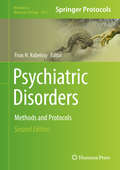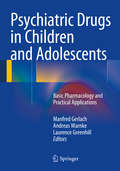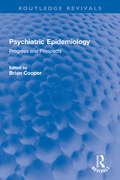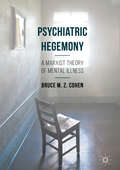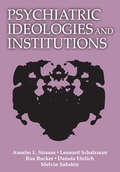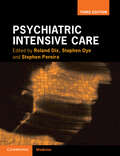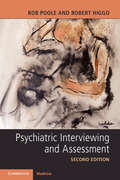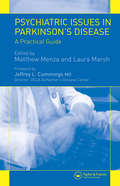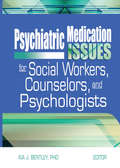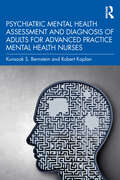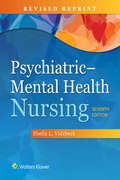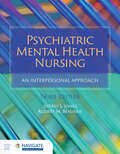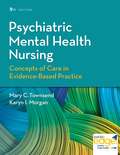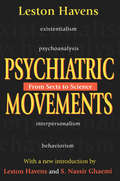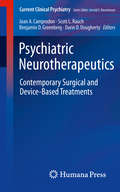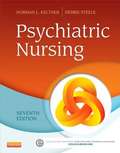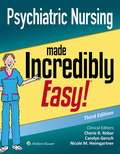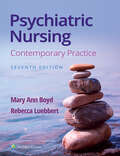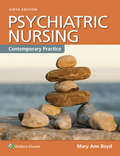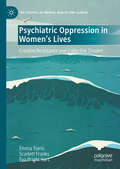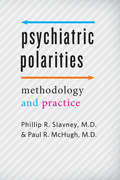- Table View
- List View
Psychiatric Disorders: Methods and Protocols (Methods in Molecular Biology #2011)
by Firas H. KobeissyThis second edition volume expands on the previous edition with updates to chapters and new chapters discussing the latest research in neuropsychiatric diseases. The chapters in this book are organized into eleven sections and cover the diversity and utility of animal models of psychiatric disorders, their development, modelling, and pathophysiological and molecular profiles. Part One looks at experimental modeling of neuropsychiatric studies and the usefulness and need of animal models. Parts Two and Three focus on experimental models of neuropsychiatric illnesses, including self-injurious behavior, bipolar disorder, anxiety, and learning and decision-making testing. Parts Four and Five discuss animal models of substance abuse. Part Six describes protocols to examine animal models related to maladaptive eating habits and behaviors. Parts Seven and Eight cover neurodegenerative diseases stemming from natural causes (aging), abnormal genetic backgrounds, or those brought on by trauma. Part Nine talks about inflammatory and metabolic alteration profiles relevant to autism spectrum disorders and depression. Parts Ten and Eleven conclude the book with a discussion on genetics, epigenetics, and system biology in the field of psychiatric disorders. Written in the highly successful Methods in Molecular Biology series format, chapters include introductions to their respective topics, lists of the necessary materials and reagents, step-by-step, readily reproducible laboratory protocols, and tips on troubleshooting and avoiding known pitfalls.Cutting-edge and thorough, Psychiatric Disorders: Methods and Protocols, Second Edition is a useful resource for graduates, postdoctoral workers, and established scientists working in the fields of behavioral and molecular neuropsychiatric research.
Psychiatric Drugs in Children and Adolescents
by Manfred Gerlach Andreas Warnke Laurence GreenhillThis book offers a comprehensive survey of the current state of knowledge in the field of neuro-psychopharmacology in childhood and adolescence. In the first part, the essentials of neuro-psychopharmacology are presented in order to provide a deeper understanding of the principles and particularities in the pharmacotherapy of children and adolescents. This part includes information on neurotransmitters and signal transduction pathways, molecular brain structures as targets for psychiatric drugs, characteristics of psychopharmacological therapy in children and adolescents, ontogenetic influences on pharmacokinetics and pharmacodynamics, and pharmacotherapy in the outpatient setting. The part on classes of psychiatric medications, which covers antidepressants, antipsychotics, anxiolytics and sedative-hypnotics, mood stabilizers, and psychostimulants and other drugs used in the treatment of attention-deficit/hyperactivity disorder, provides sufficient background material to better understand how psychoactive drugs work, and why, when, and for whom they should be used. For each drug within a class, information on its mechanisms of action, clinical pharmacology, indications, dosages, and cognate issues are reviewed. In the third part, the disorder-specific and symptom-oriented medication is described and discerningly evaluated from a practical point of view, providing physicians with precise instructions on how to proceed. Psychiatric Drugs in Children and Adolescents includes numerous tables, figures and illustrations and offers a valuable reference work for child and adolescent psychiatrists and psychotherapists, pediatricians, general practitioners, psychologists, and nursing staff, as well as teachers.
Psychiatric Encounters: Madness and Modernity in Yucatan, Mexico (Medical Anthropology)
by Beatriz M. Reyes-FosterPsychiatric Encounters presents an intimate portrait of a public inpatient psychiatric facility in the Southeastern state of Yucatan, Mexico. The book explores the experiences of patients and psychiatrists as they navigate the challenges of public psychiatric care in Mexico. While international reports condemning conditions in Mexican psychiatric institutions abound, Psychiatric Encounters considers the large- and small-scale obstacles to quality care encountered by doctors and patients alike as they struggle to live and act like human beings under inhumane conditions. Beatriz Mireya Reyes-Foster closely examines the impact of the Mexican state’s neoliberal health reforms on how patients access care and doctors perform their duties. Engaging with madness, modernity, and identity, Psychiatric Encounters considers the enduring role of colonialism in the context of Mexico's troubled contemporary mental health care institutions.
Psychiatric Epidemiology: Progress and Prospects (Routledge Revivals)
by Brian CooperFirst published in 1987, Psychiatric Epidemiology brings together global contemporary research and data relating to psychiatric epidemiology. The book comprises edited papers from the World Psychiatric Association symposium held in Edinburgh, September 1985. Divided into six parts, it covers demographic and ecological surveys; life events, stress and social support; longitudinal and cohort studies; epidemiology and clinical issues; alcoholism and alcohol-related disorders; and epidemiology in mental health service planning. Psychiatric Epidemiology will appeal to those with an interest in the history of psychiatric epidemiology and mental health.
Psychiatric Ethics in Late-Life Patients: Medicolegal and Forensic Aspects at the Interface of Mental Health
by Aarti Gupta Meera Balasubramaniam Rajesh R. TampiThe process of aging is frequently associated with changes in the physical and mental functioning of older adults, challenging their autonomy and rendering them vulnerable to exploitation. Certain illnesses that are more common in older adults can affect their capacity to function independently. These include the capacity to make medical decisions, live independently, manage finances, to name a few. Healthcare professionals, especially psychiatrists are often entrusted with the responsibility of assessing an older adult’s capacity to perform one or more functions. This makes it imperative for them to be cognizant of these issues, understand the need for these evaluations, and be able to conduct them in a comprehensive manner. Another way of protecting an older person’s rights and facilitating a life based on their own decisions even after they lose decision making capacity is Advanced Health Care Planning (AHCP). Health care professionals are required to initiate a discussion about AHCP with their patients and their families and review it periodically. Lastly, the older adults incarcerated in prisons is a group that is growing in numbers. They have unique needs at the intersection of the geriatric and forensic services, but are often marginalized by both services. The combination of poor quality of life and increasing costs makes the care of older adults in the criminal justice system makes this topic an important public health concern. There is a pressing need for better training of prison staff in issues of geriatric psychiatry. Assessment of criminal responsibility and competence to stand trial in aging offenders are other complex but under-studied issues. This proposed book will provide a comprehensive view of ethical, medicolegal, and forensic issues that will be useful in clinical practice. There will be three sub-sections, each focusing on ethical, medicolegal and forensic issues respectively. The first section will focus on ethical issues. Its first chapters will provide an overview of the how age and the process of aging influence decision-making and introduce unique ethical dimensions to clinical care. This will be followed by a discussion of the concepts of informed consent and capacity evaluation. The next chapters will focus on common scenarios that arise in the care of elderly patients and offer a practical approach to understanding and managing them. These will include assessments of the capacity to make medical decisions, the capacity to live independently, manage finances, drive a vehicle, have sexual relations etc. A chapter on ethical issues specific to dementia will outline issues related to diagnostic disclosure and genetic testing. Research ethics issues in geriatric psychiatry will also be outlined. The next section of the book will focus on surrogate decision making in an older adult who has been deemed to lack the capacity to serve one or more functions independently. The first chapters in this sub-section will focus on patient directed advance health care planning tools, namely, living will and power of attorney. This will be followed by an overview of default surrogate making. Guardianship will subsequently be covered. A separate chapter will cover the issue of elder abuse and discuss an approach to assessing it. The last section of the book will cover forensic issues in geriatric psychiatry. The first chapter will discuss aging older adults in the criminal justice system from an epidemiological perspective. The growing numbers of incarcerated older adults, their illness burden, the challenges in the diagnosis and management of neurocognitive disorders in the prison setting will be elucidated. The following chapter will discuss competence to stand trial with reference to elderly offenders. This will be followed by a discussion of the concepts of medical reprieve, compassionate release as well as model programs and policies currently in the works for older incarcerated adults.
Psychiatric Genetics
by Frank Bellivier Marion LeboyerPsychiatric Genetics provides the reader with a complete view of the methodological problems encountered in psychiatry genetics and proposes solutions to commonly occurring questions. The best European and American specialists have given a thorough review on the advantages and disadvantages of genetic epidemiological methods, the way to choose a genetic marker or a clinical interview and how to ascertain patients, unaffected relatives and controls and what should be the criteria to include a case or a control. New phenotypic methods are described focusing on candidate symptom and endophenotype approaches. Examples coming from cognitive neurosciences, biochemistry, electrophysiology and brain imaging techniques are reviewed. This book will serve as an essential handbook for psychiatrists, psychologists, and geneticists involved in the genetics of psychiatric disorders.
Psychiatric Hegemony
by Bruce M. Z. CohenThis book offers a comprehensive Marxist critique of the business of mental health, demonstrating how the prerogatives of neoliberal capitalism for productive, self-governing citizens have allowed the discourse on mental illness to expand beyond the psychiatric institution into many previously untouched areas of public and private life including the home, school and the workplace. Through historical and contemporary analysis of psy-professional knowledge-claims and practices, Bruce Cohen shows how the extension of psychiatric authority can only be fully comprehended through the systematic theorising of power relations within capitalist society. From schizophrenia and hysteria to Attention-Deficit Hyperactivity Disorder and Borderline Personality Disorder, from spinning chairs and lobotomies to shock treatment and antidepressants, from the incarceration of working class women in the nineteenth century to the torture of prisoners of the 'war on terror' in the twenty-first, Psychiatric Hegemony is an uncompromising account of mental health ideology in neoliberal society.
Psychiatric Ideologies and Institutions
by Anselm L. StraussThe authors of this volume point out that what is ordinarily termed the psychiatric hospital's "social structure" is principally derived from three sources: the number and kinds of professionals who work there; the treatment ideologies and professional identities of these professionals; and the relationships of the institution and its professionals to outside communities, both professional and lay. They describe hospitals as sites where ideological battles characterizing the mental health arena are being fought, implemented, critiqued, modified, and transformed. This classic monograph in medical sociology was originally published in the 1960s. The period studied was 1958 through 1963, when somatic and psychotherapeutic ideologies were flourishing—as now—and milieutherapy was just emerging. The research team was multidisciplinary: three sociologists, one psychologist, and one psychiatrist. Three distinct psychiatric environments were researched: two at the Chicago State Hospital—"chronic services" and "treatment services"—and one at a private hospital. What evolved were thoughtful comparative analyses of hospitals, wards, professionals, ideological positions, careers, and organizational and situational placements.
Psychiatric Intensive Care
by Roland Dix Stephen Dye Stephen M. PereiraFully expanded and updated, this third edition remains an essential reference text for all healthcare professionals and managers involved in the care of the mentally ill patient, particularly in the intensive care environment. It provides practical and evidence-based advice on the management of a diverse range of disturbed and severely ill psychiatric patients in secure hospital settings. Content is focused upon some of the most challenging areas of in-patient and acute mental health practice including the PICU, the acute in-patient, and the forensic and acute mental health crisis occurring in the community. Brand-new chapters explore topics such as challenging and sexually problematic behaviour within an in-patient and other settings, and international perspectives on PICU wards. This edition also covers technological developments for improving mental health care for patients, safety for those working and living within mental health units and importantly incorporates the UK MHA Code of Practice 2015.
Psychiatric Interviewing and Assessment
by Rob Poole Robert HiggoInterviewing and assessment are integral to the practice of psychiatry, and this book helps psychiatrists and other mental health professionals develop the skills needed to gain the right information to make diagnostic formulations and build therapeutic relationships with their patients. The text examines common dilemmas and problems in an engaging and accessible way, and the use of case studies relates the principles discussed to identifiable psychiatric settings. This new edition has been revised and expanded to reflect changes in clinical practice in recent years. New chapters have been added covering the assessment of neurodevelopmental disorders, fragmented interviews and 'impossible' clinical situations such as the assessment of intoxicated patients and rhetorical interviews. Essential reading for all mental health professionals, the practical grounding in real-world clinical experience will benefit trainee psychiatrists, experienced clinicians, nurses, social workers and physician associates.
Psychiatric Interviewing: The Art Of Understanding: A Practical Guide For Psychiatrists, Psychologists, Counselors, Social Workers, Nurses, And Other Mental Health Professionals, With Online Video Modules
by Shawn Christopher SheaWith time at a premium, today's clinicians must rapidly engage their patients while gathering an imposingly large amount of critical information. These clinicians appropriately worry that the "person" beneath the diagnoses will be lost in the shuffle of time constraints, data gathering, and the creation of the electronic health record. Psychiatric Interviewing: The Art of Understanding: A Practical Guide for Psychiatrists, Psychologists, Counselors, Social Workers, Nurses, and other Mental Health Professionals, 3rd Edition tackles these problems head-on, providing flexible and practical solutions for gathering critical information while always attending to the concerns and unique needs of the patient. Over five years in the making, this classic introduction to the art of clinical interviewing returns, updated, expanded and innovatively designed for today's reader with over 7.5 hours of streaming video integrated directly into the text itself. Readers now also become viewers, acquiring the rare opportunity to see the author both illustrating specific interviewing techniques and subsequently discussing effective ways in which to employ them. The founder and Director of the acclaimed Cape Cod Symposium, Rob Guerette, describes Dr. Shea's skills as a speaker as follows, "Dr. Shea is an extremely gifted teacher, whose vibrant story-telling skills and compelling videos have led to him garnering some of the highest evaluations in the 30 year history of the Cape Cod Symposium. In short, readers are in for a rare treat when viewing the book's video component."
Psychiatric Issues in Parkinson's Disease: A Practical Guide
by Laura Marsh Matthew Menza Jeffrey L CummingsA practical guide to the management of various clinical issues seen in patients with Parkinson's Disease (PD), this text emphasizes the need for coordinated care between the various professionals, as well as between professionals and caregivers. Providing an update on current developments in the neurology and management of PD, as well as the unders
Psychiatric Medication Issues for Social Workers, Counselors, and Psychologists
by Kia J. BentleyLearn more about psychiatric medications to better understand your clientele! Psychiatric Medication Issues for Social Workers, Counselors, and Psychologists explores a range of issues and dilemmas in psychopharmocology practice that emerge especially for social workers, counselors, and psychologists because of their unique roles and perspectives. This book contains qualitative and quantitative research examining the subjective experience of clients who use psychiatric medication. You&’ll find unprecedented discussion of clinical and ethical situations that arise when social workers and allied health caregivers collaborate with clients and providers around psychiatric medicine. This book contains creative ideas on how social workers and other allied health providers can be more responsive to both adults and children who take medication. Psychiatric Medication Issues for Social Workers, Counselors, and Psychologists focuses on the meaning of medication for the clients who use them and their positive and negative experiences with them over time. This book serves as an innovative forum and effective springboard for productive discussion among practitioners, scholars and researchers about psychiatric medication&’s relevance to-and interface with-social work practice. This book is designed to help practitioners: understand how clients manage their psychotropic medications and interpret their effects maximize the chances for successful treatment outcome by understanding the meaning, transference, and countertransference stimulated by the triangle created by the client, social worker, and psychopharmacological provider map the sociocultural context of youth medication management and help youthful clients adopt coping mechanisms for everyday medication treatment confront a variety of ethical dilemmas, such as ambiguities around the knowledge base of practice, appropriate roles of providers, and basic personal and professional values secure informed consent when discussing proposed treatments (including medications) and explain alternative treatments without breaking informed consent laws promote effective and comprehensive helping relationships by being cognizant of alternative practices, herbal preparations, and essential oil and flower essence products that clients could be using on their own This book contains extensive references, suggestions for client-consultation questions, research findings, and interviews with social workers to complement the text. Unique in its focus on the client&’s point of view, Psychiatric Medication Issues for Social Workers, Counselors, and Psychologists will help you overcome any difficulties of working with clients in drug therapy.
Psychiatric Mental Health Assessment and Diagnosis of Adults for Advanced Practice Mental Health Nurses
by Robert Kaplan Kunsook S. BernsteinThis text provides a comprehensive and evidence-based introduction to psychiatric mental health assessment and diagnosis in advanced nursing practice. Taking a clinical, case-based approach, this textbook is designed to support graduate nursing students who are studying psychiatric mental health nursing as they develop their reasoning and decision-making skills. It presents: Therapeutic communication and psychiatric interviewing techniques, alongside basic psychiatric terminologies. The major psychiatric diagnoses, drawing on the DSM-5. A step-by-step guide to conducting a comprehensive psychiatric mental health assessment. Case examples demonstrating assessment across major psychopathologies. Good practice for conducting mental health evaluations. This is an essential text for all those undertaking psychiatric mental health nurse practitioner programs and a valuable reference for advanced practice nurses in clinical practice.
Psychiatric Mental Health Nursing (Coursepoint Ser.)
by Sheila L. VidebeckExploring the full psychiatric nursing curriculum, this student-friendly book focuses on the skills and concepts needed for successful practice. Short concise chapters, an engaging art program, and a direct and personal approach guide students in building therapeutic communication skills within the framework of the nursing process. Access to the online video series, Lippincott Theory to Practice Video Series, provides students with an even deeper understanding of patients experiencing mental health disorders. Doody's Review Service gives this book a Weighted Numerical Score of 90 - 4 Stars! "The book is comprehensive, well written, and full of resources. The Concept Mastery Alerts in the chapters help students focus on critical content. The book is color-coded, making it easy for students to follow the format of each chapter." - Doody's Review Service
Psychiatric Mental Health Nursing: An Interpersonal Approach
by Dr. Jeffrey Jones Dr. Audrey BeauvaisPsychiatric Mental Health Nursing: An Interpersonal Approach, Third Edition is a foundational resource that weaves both the psychodynamic and neurobiological theories into the strategies for nursing interventions.
Psychiatric Mental Health Nursing: Concepts of Care in Evidence-Based Practice
by Mary Townsend Karyn MorganA well-organized, clear, and concise textbook on the basic concepts of psychiatric/mental health nursing. Focusing on holistic nursing, this practical resource can be used by students and nurses alike. Key elements include historic and epidemiologic factors, background assessment data with predisposing factors/symptomatology with each disorder, and much more. Each chapter includes objectives, glossary, case studies, review questions, and other tools. Illustrated.
Psychiatric Movements: From Sects to Science
by Leston HavensIn the early 1970s, the preeminence of psychoanalysis in the treatment of mental illness gave way to a number of other approaches. Yet, rather than practicing in cooperation, the different schools--existentialism, psychoanalysis, interpersonalism, behaviorism--each taught its own methods, convinced it was the true psychiatry. As a result, all too frequently, varieties of psychiatry have come and gone, wallowing in a battle of sects rather than progressing toward knowledge.In Psychiatric Movements, Leston Havens posits that psychiatry must adopt a pluralistic stance, for only an inclusive psychiatry can bridge the traditional scientific quest of medicine with a humanistic interest in whole lives, inner states, and relationships with others. If for no other reason, from an ethical standpoint, the patient should get the treatment he needs, not the one treatment the doctor dispenses. This edition includes a new introduction explaining changes in the field during the last thirty years.
Psychiatric Neurotherapeutics
by Darin D. Dougherty Joan A. Camprodon Scott L. Rauch Benjamin D. GreenbergThis volume covers the gamut of surgical and device-based treatments for psychiatric disorders. Written by experts in the field, this book covers neuroscience advances in the neurobiological underpinnings of psychiatric diseases, emerging surgical and device-based treatments, and advances in the field. Topics include electroconvulsive therapy, transcranial magnetic stimulation, Vagus nerve stimulation (VNS), and many other cutting-edge treatments and techniques. Psychiatric Neurotherapeutics is a valuable resource for psychiatrists, neurosurgeons, neurologists, researchers, and all other medical professionals interested in surgical and device-based treatments of psychiatric disorders.
Psychiatric Nursing (Seventh Edition)
by Norman L. Keltner Debbie Steele<P>Learn the therapeutic skills you need to succeed in the nurse’s role in psychiatric care!<P> Psychiatric Nursing, 7th Edition uses a practical approach to psychotherapeutic management that clearly explains how to manage and treat individuals with psychiatric disorders.<P> It emphasizes the nurse’s three primary tools: you and your relationship with patients, medications, and the environment. <P>This edition adds a new chapter on forensics along with coverage of the latest trends and treatments.<P> Written by educators Norman Keltner and Debbie Steele, this text provides a solid, real-world foundation for the practice of safe and effective psychiatric nursing care.
Psychiatric Nursing Made Incredibly Easy! (Incredibly Easy! Series®)
by Cherie R. Rebar Carolyn J. Gersch Nicole HeimgartnerNeed an insightful, real-world guide to mental health care concepts? The newly updated Psychiatric Nursing made Incredibly Easy, 3rd Edition addresses numerous mental health nursing issues, defining disorders and management strategies and offering down-to-earth guidance on a range of care issues — all in the enjoyable Made Incredibly Easy® style. With guidance that applies to any healthcare setting, this colorfully illustrated guide walks you through the vital skills needed for psychiatric mental health nursing care, offering solid support for being exam-ready and for handling a range of mental health and substance use concerns while on the job.
Psychiatric Nursing: . Contemporary Practice
by Mary Ann Boyd Rebecca LuebbertPsychiatric Nursing: Contemporary Practice, 7th Edition, simplifies your students’ path to success in psychiatric mental health nursing, providing a comprehensive, recovery framework approach that emphasizes interventions and wellness promotion to ensure positive patient outcomes. This trusted, up-to-date text makes complex concepts easy to understand and incorporates a wealth of examples, case studies, clinical vignettes, and patient experience videos to help students confidently apply what they’ve learned in the clinical setting.
Psychiatric Nursing: Contemporary Practice (Coursepoint+ Ser.)
by Mary Ann BoydPsychiatric Nursing: Contemporary Practice 6th edition provides instructors and students a comprehensive, recovery model approach to psychiatric mental health nursing. Mary Ann Boyd presents complex concepts in an easy-to-understand language with case studies, clinical vignettes, and patient experience videos for students to practice and apply psychiatric mental health content.
Psychiatric Oppression in Women's Lives: Creative Resistance and Collective Dissent (The Politics of Mental Health and Illness)
by Emma Tseris Scarlett Franks Eva Bright HartThis book provides a comprehensive analysis of women's experiences within mental health services, demonstrating the need for a radical paradigm shift in how women's distress and experiences are understood. Drawing on extensive fieldwork on coercive mental health treatment, including interviews, participatory action research, arts-based research, and public sociology, the book centres the knowledge, skills, and creativity of psychiatrised women. Informed by intersectional feminism and critical mental health theory, the book explores the interlocking oppressions of psychiatric harm and patriarchal power, alongside women's survivorship and resistances. Areas covered include the pathologisation of women's emotions within mental health services, violence and deprivations in involuntary treatment, the surveillance of mothering, and social exclusions arising from psychiatric diagnoses. The book highlights the ability of collective and creative research processes to move beyond the task of documenting psychiatric harm, towards imagining rich alternatives to biomedical, therapeutic, and carceral practices in mental health. It offers a critique of the notions of ‘benevolence’ and ‘expertise’, which are commonly used to justify psychiatric coercion. It will appeal to students and scholars working across the fields of critical mental health, sociology, social work, psychiatry, mental health nursing and gender studies. Emma Tseris is senior lecturer in Social Work and Policy Studies at the University of Sydney, Australia, researching feminist and critical mental health theory. She is the author of Trauma, Women's Mental Health and Social Justice: Pitfalls and Possibilities (2019) and co-author of Using Social Research for Social Justice (2023). Scarlett Franks is a survivor researcher from the University of Sydney, Australia, who also serves on the Survivor College of the National Centre for Action on Child Sexual Abuse, the board of directors of the Grace Tame Foundation, and the Advisory Panel of the NSW Office of the Anti-Slavery Commissioner. Eva Bright Hart is a feminist survivor researcher from the University of Sydney, Australia. She is a senior social worker and public health professional from a rural area. Eva is also known as a mother, teacher, gardener, cook, author, activist and artist. As a survivor of psychiatric and gendered violence Eva uses a protective pseudonym so she can contribute without the fear of further discrimination, disablement and involuntary psychiatric treatment for herself and her family. Eva means "living one".
Psychiatric Polarities: Methodology and Practice
by Phillip R. Slavney Paul R. McHughA lively exploration of mind and brain, conscious and unconscious, patient and client.In this companion volume to their widely acclaimed Perspectives of Psychiatry, Phillip R. Slavney, M.D., and Paul R. McHugh, M.D., argue that the discontinuity of brain and mind is the source of much of psychiatry’s discord, for it leads psychiatrists to think about their discipline in terms of polar opposites: conscious or unconscious; explanation or understanding; paternalism or autonomy. Psychiatric Polarities brings together the history of ideas and such clinical issues as suicide and bipolar disorder to identify, describe, and debate these and other polar oppositions that arise from psychiatry’s inherent ambiguity.There is no single conceptual perspective that is sufficient for all of psychiatry’s concerns, Slavney and McHugh observe, yet it is both possible and necessary to transcend the denominational conflicts that plague the field. In Psychiatric Polarities, their examination of these conflicts demonstrates how a methodological approach can help to resolve disagreements rooted in partisan commitments.
